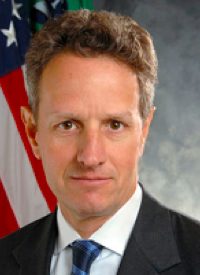
The committee claims that Geithner played a pivotal role in Lehman’s collapse and may have “unique” knowledge about a last-minute transfer of some $8 billion out of Lehman to JPMorgan just before that collapse. Lehman is suing JPMorgan in an attempt to get that money back and Geithner’s testimony is crucial. Time is running out: The discovery period for the committee ends on March 16.
The committee claims that JPMorgan did a “last-second collateral grab” in order to save itself while inflicting fatal damage on Lehman at the same time. And Geithner was in on it. The week before the Lehman collapse Geithner made 35 phone calls to Lehman’s CEO Richard Fuld and another 10 calls to JPMorgan’s CEO Jamie Dimon, and at least some of those calls, said the committee, centered on those collateral demands. Therefore, the committee insists that Geithner should be required to reveal what those calls involved.
Geithner has remained silent; however, a spokesman for the Treasury Department, Anthony Coley, said he couldn’t understand what all the fuss is about: “Treasury and the Fed have provided thousands of pages of documents and arranged for depositions of numerous other witnesses.” [Emphasis added.] In light of all that disclosure, Coley said, “it is unclear why the plaintiffs [Lehman’s committee] continue to insist on unnecessary depositions.”
Geithner has been less than forthcoming on previous occasions as well. In January 2010 Rep. Darrell Issa (R-Calif.) released a series of emails between American International Group (AIG) and the New York Fed in which the Fed urged AIG not to disclose the full details of bailouts to various banks which AIG insured using derivatives. At the time, AIG’s credit swaps insured half of the western world’s banking system. When those derivatives failed, the banks and AIG were bailed out with taxpayer funds. Geithner was in charge at the New York Fed while this was going on. When Geithner was finally forced to testify in that case, he defended those payouts and denied any attempt to withhold information. His testimony was greeted with disdain, skepticism, and anger by members of the House Oversight Committee who heard it.
If Geithner is forced to testify, it could further confirm the high-level corruption and self-dealing that surrounded the Lehman collapse and remind taxpayers of how such manipulations have cost them billions. In light of the March 16 deadline, it is clear to observers that his strategy is to lie low and keep quiet. As Graham Summers, writing at ZeroHedge, put it, “The only reason this process hasn’t already reached a fever pitch is because the benefits of not talking for most of those who were in on the corruption still outweigh the consequences…” [Emphasis in original.]
With Geithner’s announcement that he won’t stick around for another term if Obama is reelected, it seems possible, if not probable, that by waiting out the clock he will escape unscathed into oblivion. On the other hand, if he is forced to testify, and his testimony does show the suspected back-room dealings involved in saving JPMorgan at Lehman’s expense, then the lid so tightly fastened on the investigation to date will be removed. If that happens, says Gary North, “the public will find out about the nature of crony capitalism [and] the voters’ trust in the existing system will disappear.”
Photo: Timothy Geithner


